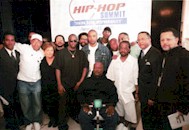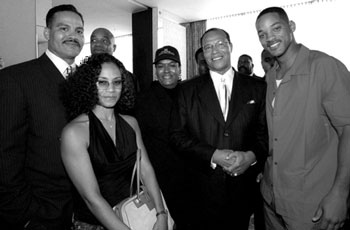By Richard Muhammad
and Saeed Shabazz

NEW YORK (FinalCall.com) – Facing potential congressional oversight, constant criticism from the mainstream press, and with many rap legends and artists concerned about its future, hip hop returned to its birthplace June 12-13 and plotted a new course.
That future will likely include greater self-regulation, increased political activism, more enlightened expressions and a deeper understanding of how hip hop culture has moved from Big Apple streets to become a global force and a billion dollar industry.
Hip hop accounts for 12.9 percent of all domestic record sales, according to the Recording Industry Association of America. In 2000, the overall recording industry made $14.3 billion, the trade group says.
When rap guru Russell Simmons–who has taken hip hop from records to CDs to fashion to the Internet and other entertainment venues–called the Hip Hop Summit at a Manhattan hotel, major artists, recording industry insiders and execs, members of Congress, academics, civil rights groups and the leader of the Nation of Islam accepted invitations.
“The Hip Hop Summit is about building bridges on a myriad of levels where politicians, civil rights leaders, artists and music executives are coming together to find out where we stand in the world at large,” said Mr. Simmons.
Over two days, artists, scholars and record company execs–with the media often kept at bay–held panel discussions and private meetings. A major media forum was a June 13 address by the Honorable Minister Louis Farrakhan and a previous day’s panel on youth and the future of hip hop.
Issues that dominated summit dialog: getting artists and the entertainment industry to take responsibility for itself; providing an opportunity for conflict resolution among artists who have differences; and closely examining artist development and marketing to elevate the art form.
Min. Benjamin Muhammad, a summit moderator and special assistant to Min. Farrakhan, said the private meetings provided for frank, detailed discussions. According to the director of the Million Family March Movement, assignments came out of each meeting. Plans are to keep building the budding coalition, not creating a new organization, he said. That work hopes to include things like partnerships with the National Urban League to promote literacy and voter education work with the NAACP. Urban League president Hugh Price and NAACP leader Kweisi Mfume both attended the summit.
Min. Farrakhan, in a two-hour message, urged artists to harness their power to more enlightened lyrical expressions to combat injustice, racism and exploitation. He also urged critics to reach out to artists and help change conditions that spawn offensive lyrics.
While hip hop wants to preserve the right to “keep it real,” some also plan to challenge artists when “thugged out” lyrics are from imagination, not experience.
“We basically (want to) emphasize truth, we’re not telling any artist to censor themselves or to not tell the truth. A lot of the dark things you hear are simply the truth,” said Sean “Puffy” Combs. To change “dark things” means changing negative environments and peoples’ daily reality, a change hip hop wants to impact through more political and social activism, he explained.
At the same time, record company executives should talk to young artists whose reality is far removed from their hard-core lyrics, said Mr. Combs. “We don’t censor them, but we pull their coat and say, ‘Come on, man, you ain’t really selling no drugs. You’re not living that,’ ” he said.
The head of Bad Boy Records also said personal experience–an acquittal following a trial involving weapons and assault charges earlier this year–has helped him mature. The conversation on lyrics was about sharing experiences, the future of hip hop and sharing insight with younger artists to emphasize the truth, Mr. Combs said. Bad Boy Records will not allow artists to glorify dark experiences they have not lived, he added.Give the people what they want, or what they need?
The summit was a unique opportunity to collectively assess hip hop as an industry and its accountability to the Black community, observed Chuck D of Public Enemy. It is also a time to see whether the industry is serving the needs of Black people and promote a broader variety of artistic expression, he said. He also believes the industry is detached from the life of many Blacks, not living in New York or Los Angeles.
Public Enemy, whose popularity soared in the 1980s without airplay, has advocated empowerment and self knowledge, he said. “Progress is a struggle, to digress is real easy. Often when it comes down to us as a people, the low road is promoted and is much more lucrative. Black death is profitable,” said Chuck D. Tupac Shakur sold five millions records in life and 22 million after his death, the longtime hip hop activist noted.
“It’s a case in point that we’re better off dead when it comes down to a business that’s run by lawyers and accountants,” he said.
Black music’s contributions are too vast to be limited to talk of how many records are sold, Chuck D continued. Younger artists have to be coached by older artists, which happens in sports but not in the music industry, he noted.
The state of hip hop today reflects American society–with the attendant confusion, mis-communication, wealth, individualism and disconnected groups working on the same causes, said Sway, a reporter for MTV News and “The Wake-Up Show,” a syndicated radio program. Hip hop needs to police and define itself to preserve power, he said.
“Rap music has become a commodity; it’s become a product and we’ve lost control. We don’t have control over who gets signed; we don’t have control over the big money as a whole. We have little percentage deals, distribution deals, imprint deals but we don’t run the distribution. It’s come to a time where we need to take ownership of this, understand its power and affect on the world and do good by it,” he said.
Control was an important part of discussions, with concern over Connecticut Democrat Joe Lieberman’s Senate bill to have the Federal Trade Commission regulate hip hop lyrics. Hillary Rosen, president of the Recording Industry Association of America, called the bill blatantly unconstitutional.
Lyrics are so open to interpretation, unlike images on film, that arbitrary federal control is wrong headed, she said. Her group lobbies for most of the companies that sell music in the United States.
She found some allies in Congressional Black Caucus members Earl Hilliard (D-Ala.), Cynthia McKinney (D-Ga.) and Bennie Thompson (D-Miss.), who participated in opening day activities ands spoke with the press. All three lawmakers opposed censorship from Capitol Hill, citing the volatile mix of hip hop ignorance, politics, race and economics. Rep. Hilliard said parental advisory labels that warn of explicit content are good, but urged a new level of self-policing was needed. The summit came days after the FCC fined a radio station for playing an edited version of a song by rapper Eminem.
“It is time for the hip hop community, civil rights and the business community to come together to forge an agenda to move the nation forward,” Martin Luther King III told The Final Call. “My greatest expectation is that after two days the flame does not die, that there are direct steps that come out of this summit, and that may mean coming together five, six more times,” Mr. King said.

Actor/rapper Will Smith also has expectations. “Today’s Hip-Hop Summit opened a dialogue which is always important, but like Sister Souljah said, how do we put it into action? It’s always difficult to quantify the effects of the summit during the summit. I’m excited to see the people and willing at least to discuss the fact that hip hop has been on a negative downward spiral for quite a few years, so let’s acknowledge that. The first step is to acknowledge it and the next step is to figure out what to do about it.”
For hip hop artist Eric B, who has been in the rap game since 1986, beyond politics, record deals and performances, artists need to be fully developed. Problems with drug, alcohol and abuse of women abound in the industry and need to be dealt with, he argues. When artists have hit records things are great but when personal problems hit, artists are abandoned, said Eric B. Artists need to embrace one another and record companies must teach artists how to be “real people,” he said.
“You go from just being an everyday guy to all of a sudden all these women want to sleep with you. Everybody wants to be your friend, everybody wants to give you something,” he explained. If artists are not prepared for the downside, they can end up killing themselves or someone else, he said. If the summit doesn’t do more toward dealing with people this is just a conversation about the last conversation, said Eric B, referring to previous meetings.
“Right now we’re at the final frontier of hip hop music,” said Vinny, of Naughty By Nature. Artists have owned record labels and the next stage is economic development and political impact, he said.
“We have to use this money we’re making; we can reinvest in all of our ’hoods, like we’re doing in Jersey–urban development. You know, all the ’hoods in the ghetto, clean that junk up. Build up new houses and social programs and all that stuff politically and economically. And then you have a lot of politicians who are in there stealing money. So, if we come in there independently financed, support candidates who are not going to steal money, then a lot of these federal monies that come into these cities would actually go into these programs,” he said.
“We come from the era when battling was battling,” said Treach, the other half of Naughty By Nature and host of a hip hop TV show. Rappers would compete and lyrically challenge one another without violence, he said. “We’re here to just bring a whole hip hop vibe and movement together as one, because this is our future and this is our livelihood. So, if we destroy it, it’s not going to be here anymore,” said Treach.












